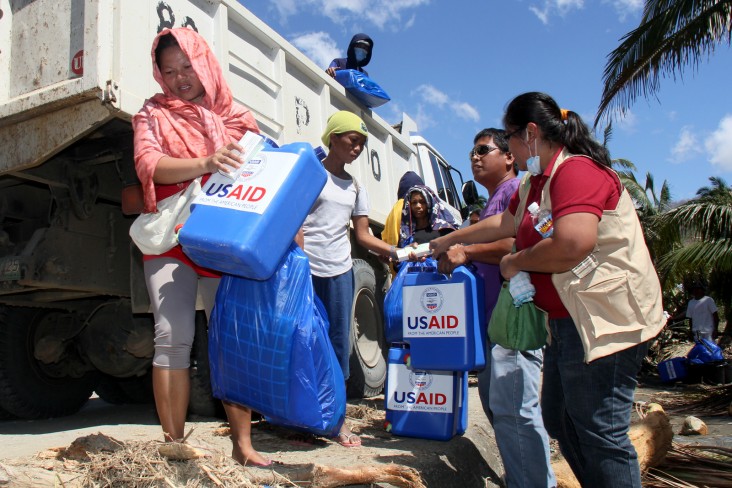Speeches Shim

Situated on the Western Pacific typhoon belt and the fringes of the Pacific Ring of Fire, the Philippines is regularly affected by various natural disasters. Between June and November each year, typhoons often trigger flooding, landslides and storm surges throughout the country that result in the loss of lives, homes and livelihoods. Dotted with approximately 20 active volcanoes and located between two major fault lines, the Philippines also experiences high levels of seismic and volcanic activity. Since 1990, USAID’s Office of U.S. Foreign Disaster Assistance (OFDA) has responded to 50 disasters in the Philippines.
Recognizing the significant disaster risk in the Philippines, USAID/OFDA maintains robust disaster risk reduction programs that build the capacity of local communities, government agencies and nongovernmental organizations to prepare for and respond to the range of natural disasters that frequently impact the country.
Building Capacity to Endure Severe Shocks
Catholic Relief Services (CRS) is providing training and support for community-based disaster risk reduction programs. In Metro Manila, CRS is leading municipality and city disaster risk reduction and management council planning and implementation in urban informal settlements. Since FY 2014, USAID/OFDA has supported CRS to enhance community resilience in Metro Manila, as well as in three municipalities and 15 villages in Compostela Valley, Mindanao. CRS projects in the area include clearing channels, constructing flood-resilient infrastructure and improving evacuation centers and early warning systems. CRS is also organizing youth- and civil society-led waterway and community cleanup projects, promoting solid waste management and providing livelihoods support to at-risk women.
Conducting Incident Command System Training
With support from USAID/OFDA, U.S. Forest Service is conducting Incident Command System (ICS) training programs for local incident management teams, national disaster management authorities, first responders, the Philippine Armed Forces and local disaster response officials in provinces where USAID/OFDA disaster risk reduction activities are being implemented. Globally recognized as a best practice for emergency response, ICS provides organizational structure and processes to make rapid response faster and more effective. ICS helps facilitate personnel from multiple agencies to fit rapidly into a uniform management structure that streamlines planning and resource allocation during an emergency situation.
Enhancing Disaster Preparedness by Increasing Logistics Surge Capacity
With support from USAID/OFDA, the World Food Program is coordinating with Philippine National Disaster Risk Reduction and Management Council to make vital relief materials readily available and accessible when disasters strike. This includes pre-positioning of temporary generators, office units, temporary storage tents and other logistics equipment in World Food Program warehouses in Luzon, Visayas and Mindanao. USAID is also helping the government facilitate transportation of equipment to affected areas by road, air and sea. In case a major emergency requires additional logistics support, World Food Program stands ready to supplement the Philippine government’s relief activities by airlifting up to 100 metric tons of relief items from other WFP warehouses in the region.
Increasing Disaster Resilience through Livelihoods Strengthening
USAID/OFDA works with Catholic Relief Services (CRS) to increase the capacity of vulnerable communities to prepare for and recover from frequent typhoons. The program supports and trains local authorities to develop comprehensive disaster management plans, as well as trains coconut farming and fishing households to implement diversification and savings strategies to increase their resilience to disasters. With USAID/OFDA support, CRS is bolstering livelihoods and mitigating disaster risk through household-, community-, district- and municipal-level interventions.
Increasing Public-Private Collaboration on Disaster Preparedness
The Philippine Disaster Resilience Foundation (PDRF), a network of 73 member companies, is working with local authorities and businesses to build community awareness of disaster risks and improve coordination before, during and after disasters occur. With USAID/OFDA funding, PDRF strengthens Philippine government and private sector cooperation to reduce disaster risks and protect common critical assets in two at-risk barangays in Metro Manila. The partnership also conducts forums and consultations between PDRF members and the Philippine National Disaster Risk Reduction and Management Council to develop a partnership agreement between stakeholders and deepen engagement in disaster coordination.
Reducing Vulnerabilities in Mindanao
USAID/OFDA is supporting the Center for Disaster Preparedness Foundation to enhance the capacity of vulnerable communities in the Zamboanga Peninsula to withstand the negative effects of drought and floods. The Center for Disaster Preparedness Foundation is reducing the risks and vulnerabilities associated with disasters while building the capacity of city and provincial officials to implement safety procedures. Program activities include advocating for public investment in risk reduction planning, establishing early warning systems and working with local authorities to improve disaster readiness.
Strengthening Humanitarian Coordination, Information Management and Preparedness
USAID/OFDA is supporting the United Nations Office for the Coordination of Humanitarian Affairs (OCHA) to increase the technical capacity of the Philippine government to undertake preparedness and response activities and activate in-country humanitarian coordination mechanisms during disasters. The project also facilitates opportunities for the government to engage in regional collaborative initiatives for effective disaster risk reduction monitoring, early warning, emergency response and preparedness.
News
How You Can Help
The best way to help those affected by disasters is to make a cash donation to reputable relief and charitable organizations working in the disaster zone.
For more information, contact the Center for International Disaster Information at www.cidi.org or 202-821-1999. Visit the following site for a list of organizations responding to Typhoon Haiyan:


Comment
Make a general inquiry or suggest an improvement.